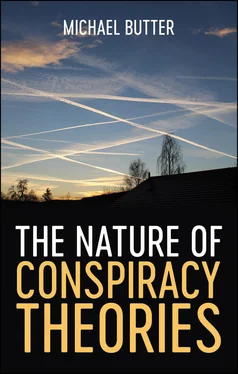In what follows, I develop this argument in six chapters, arranged in such a way that they can also be read in isolation or in a different order. In Chapter 1, I discuss various definitions and typologies of conspiracy theories, noting in particular that the term is not merely a neutral description but always implies – at least in everyday discourse – a value judgement. Chapter 2deals with the evidence used in conspiracy theories. What arguments are put forward by believers, and how do they tell the story of the plots they believe they have discovered? In Chapter 3, I analyse the different functions of conspiracy theories for individuals and groups, and discuss the question of whether some people are more receptive to such theories than others. Chapter 4traces the historical development of conspiracy theories from antiquity to the present, and ends with a discussion of the relationship between conspiracy theories and populism. Chapter 5is devoted to the impact of the internet on the visibility and status, as well as the rhetoric and argumentation, of conspiracy theories. Using the coronavirus crisis as a point of departure, the book concludes by examining whether and in what circumstances conspiracy theories are dangerous, and tackles the current controversy over what to do about them.
As a German Americanist, I draw most of my examples from the USA, the UK and the German-speaking countries, but my analysis is not limited to these cultures. Due to my systematic approach, my observations also apply to conspiracy theories and cultures that I do not mention at all. However, my perspective on conspiracy theories is that of a scholar trained in literary and cultural studies. Much of what follows is the consensus view across academic disciplines; on some issues, though, opinions are divided, and a quantitative psychologist would come to very different conclusions. I also raise questions at various points which no discipline is currently able to answer due to the fact that little or no research has been done in these areas. In this respect, my book merely marks, if anything, the end of the beginning of the study of conspiracy theories. What goes for conspiracy theorists goes for conspiracy theory researchers too: there is always more to learn.
1 Churchill, W., ‘Zionism versus Bolshevism: a Struggle for the Soul of the Jewish People’, Illustrated Sunday Herald, 8 February 1920, p. 5, at https://en.wikisource.org/wiki/Zionism_versus_Bolshevism. 2 Lee, M. F., Conspiracy Rising: Conspiracy Thinking and American Public Life, Santa Barbara, CA: Praeger, 2011, pp. 62–3. 3 Grey Ellis, E., ‘Coronavirus Conspiracy Theories are a Public Health Hazard’, Wired, 27 March 2020, at https://www.wired.com/story/coronavirus-covid-19-misinformation-campaigns. 4 Hofstadter, R., ‘The Paranoid Style in American Politics’, in The Paranoid Style in American Politics and Other Essays, Cambridge, MA: Harvard University Press, 1996 [1964], pp. 3–40. 5 Edsall, T. B., ‘The Paranoid Style in American Politics is Back’, New York Times, 8 September 2016, at https://www.nytimes.com/2016/09/08/opinion/campaign-stops/the-paranoid-style-in-american-politics-is-back.html; Musgrave, P., ‘Donald Trump is Normalizing Paranoia and Conspiracy Thinking in U.S. Politics’, Washington Post, 12 January 2017, at https://www.washingtonpost.com/posteverything/wp/2017/01/12/donald-trump-has-brought-us-the-american-style-in-paranoid-politics/?utm_term=.dee6f1f76c8f; Lynch, C., ‘Paranoid Politics: Donald Trump’s Style Perfectly Embodies the Theories of Renowned Historian’, Salon, 7 July 2017, at http://www.salon.com/2016/07/07/paranoid_politics_donald_trumps_style_perfectly_embodies_the_theories_of_renowned_historian; Heer, J., ‘Donald Trump’s United States of Conspiracy’, New Republic, 14 June 2016, at https://newrepublic.com/article/134257/donald-trumps-united-states-conspiracy; Clinton, H., ‘His Disregard for the Values that Make Our Country Great Is Profoundly Dangerous’, 25 August 2016, campaign speech in Reno, NV, at https://www.hillaryclinton.com/post/remarks-on-trumps-prejudice-and-paranoia-in-reno-nv. 6 Jacobsen, L., ‘Das Trump-Puzzle: Angstpolitik’, Zeit online, 3 November 2016, at http://www.zeit.de/politik/ausland/2016-10/donald-trump-puzzle-phaenomen-us-wahl-populismus; Lepenies, W., ‘Die Politik der Paranoia erreicht jetzt auch uns’, Welt.de , 10 March 2016, at https://www.welt.de/debatte/kommentare/article153103845/Die-Politik-der-Paranoia-erreicht-jetzt-auch-uns.html; Stein, H., ‘Der gefährliche Glaube an die große Verschwörung’, Welt.de , 11 September 2016, at https://www.welt.de/debatte/kommentare/article157942289/Der-gefaehrliche-Glaube-an-die-grosse-Verschwoerung.html; Hyde, M., ‘A Waco Week, as Corbynistas Do Politics in The Paranoid Style’, Guardian, 3 August 2018, at https://www.theguardian.com/commentisfree/2018/aug/03/corbynistas-politics-labour-leader. 7 For the USA, see Oliver, E. and Wood, T., ‘Conspiracy Theories and the Paranoid Style(s) of Mass Opinion’, American Journal of Political Science 58(4), 2014: pp. 952–66; for Europe, see Drochon, H., ‘Who Believes in Conspiracy Theories in Great Britain and Europe?’, in Uscinski, J. (ed.) Conspiracy Theories and the People Who Believe Them, New York: Oxford University Press, 2019, pp. 337–46.
1 ‘Everything is planned’, or: What is a conspiracy theory?
Conspiracy theories assert the existence of a covertly operating group of people – the conspirators – who seek, from base motives and by underhand means, to achieve a certain end. The word ‘conspiracy’ comes from the Latin verb conspirare , meaning to be in harmony or act in concert. A conspiracy, whether real or imagined, is therefore never the work of one individual, but always of a group, whether large or small. But conspiracy theories have other typical characteristics, too, which I discuss in the first part of this chapter, once again using the example of Winston Churchill’s text ‘Zionism versus Bolshevism’. I then go on to consider some typologies that have been proposed for the classification of conspiracy theories. In particular, I distinguish between top-down, bottom-up, internal and external varieties, as well as between scenarios centring on a specific event, a specific group of conspirators or a combination of the above. Next, I address the question of what distinguishes the plots alleged by conspiracy theorists from actual conspiracies. I show that conspiracy theories usually imagine far more comprehensive and ambitious – and hence impracticable – plots than actual conspiracies, which are very limited in terms of their scope and objectives. Above all, conspiracy theories assume a false view of people and history in claiming that history can be planned and controlled over any length of time. This leads me to the observation that the term ‘conspiracy theory’, both in everyday parlance and in academic discourse, is nearly always an evaluative concept that is used to discredit the ideas of others – even if they do not display the typical characteristics of conspiracy theories. That said, it is in my view nevertheless possible to use the term neutrally, as I argue in the fourth part of this chapter. Finally, I examine calls to replace the term ‘conspiracy theory’ with ‘conspiracy ideology’. This discussion is limited to German-speaking countries; elsewhere, scholars seem either to have no problem with it or to accept that the term ‘conspiracy theory’ is already so well established that an alternative would fail to catch on anyway. The debate is, notwithstanding, of general interest, since it highlights the question of how far conspiracy theories are in fact theories, and what distinguishes them from scientific theories.
Читать дальше












